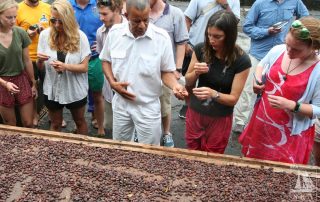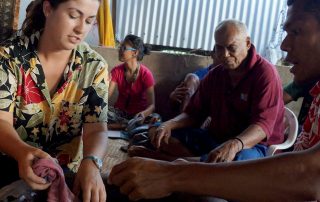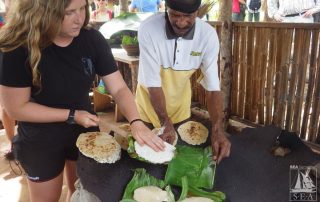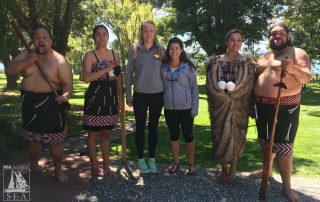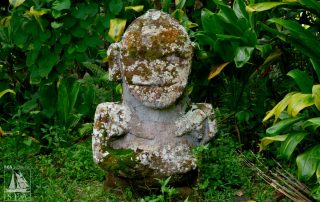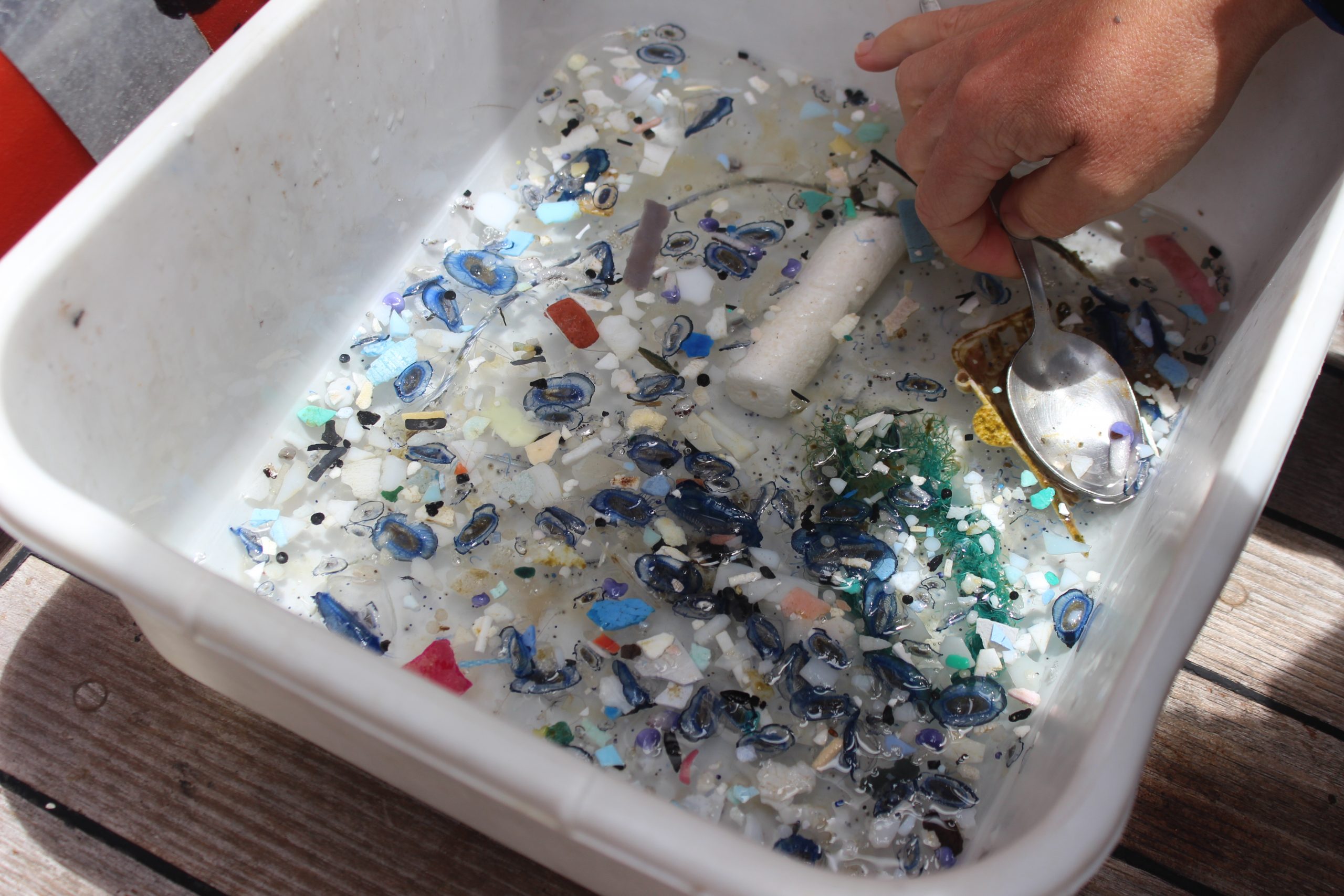Cultural Sustainability
Research @ SEA
Cultural Sustainability
Cultural sustainability is the capacity of groups of people to develop and maintain modes of living on their own terms through knowledge, practices, social networks, and objects that hold significance for them. Over several centuries, the regions through which SEA vessels sail have experienced dramatic changes from European and American mariners, missionaries, colonial governments, and migrations. New species of plants and animals were introduced, agriculture and fishing techniques altered, trading networks expanded, and community demographics impacted. SEA students examine relationships between people and their environment, appreciating the myriad ways current practices are firmly rooted in tradition while wrestling with the challenge of defining and applying concepts of cultural sustainability in the face of shifting global and regional processes. Student research methods include participant observation, such as attending ceremonies and joining people in their everyday activities, conducting structured individual and group interviews, and collecting photographic and audio-visual data.

Everyday and special practices
Sustainability is first and foremost about the everyday economic and subsistence livelihoods of individuals and communities in their local natural environments. In the places visited by SEA, practices of the everyday (productions and purchases of food, clothing, housing, and medical care) are informed by systems of belief, value, and property. These systems also guide the ritual and ceremonial life of a sustainable culture – the practices that mark the sacred, the transitional, and the extraordinary.
Social networks
People connect with each other through a variety of socially-mediated processes (marriage, trade and cooperative labor, for example) as well as through shared symbolic systems such as religion. Globalized economies and rapid technological changes threaten to disrupt the bases for social connections, but also present opportunities for new modes of interpersonal exchange and cultural sustainability. SEA students explore the shifting character of human social networks within the context of a dynamic ocean environment.


Places and material culture
Culture manifests most perceptibly in people’s interactions within places and with artifacts. Sacred places, like tribal grounds and battlefields, and objects, such as fishing gear and bodily adornment conveying status or group identity, evidence a culture sustained through its material expressions. SEA students encounter significant places and objects as meaningful statements of what people wish to convey to others regarding their cultural self-identity.
Language
SEA students comprehend the notion that “every language is a rainforest of possibilities” – that locally significant modes of communication and expression inform how people know and interact with their natural and social worlds. As they engage with issues of cultural sustainability, SEA students investigate and incorporate local terms and idioms in their research while acknowledging what must remain “lost in translation” across distinct systems of meaning.
SEA faculty and collaborators: Jan Witting (SEA)

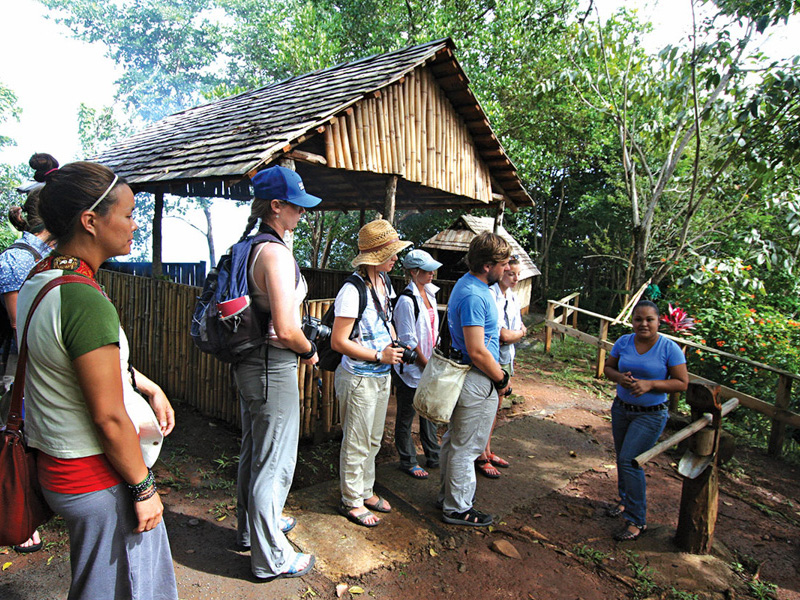
Traditional and local knowledge
Sustainable cultures require means of preserving and imparting highly adaptable skill sets that are learned and passed on. SEA students research knowledge of traditional navigation, art, subsistence fishing and gardening, transformations of raw materials into functional products, and local human and natural histories. Sustainable ways of knowing also include the often understated modes of adaptation to changing environmental conditions that are increasingly vital to community well-being.
Papers and Publications
Roberts, A., 2018. Tatai Arorangi: Maori astronomical knowledge. Unpublished student research paper, Class S-277, Sea Education Association, Woods Hole, MA.
Palmer, E., 2018. Cultural places in urban spaces. Unpublished student research paper, Class S-277, Sea Education Association, Woods Hole, MA.
King, M., 2017. Maori wetlands management in a Pakeha-run government. Unpublished student research paper, Class S-276, Sea Education Association, Woods Hole, MA.
Garcia, H.-M., 2017. Traditional ecological knowledge in New Zealand policy: investigating environmental management practices in Maori culture. Unpublished student research paper, Class S-276, Sea Education Association, Woods Hole, MA.
Vandor, I., 2017. Guided by our own awareness: examining the effect of different spatial orientation methodologies on navigational techniques of the Polynesians and Europeans. Unpublished student research paper, Class S-276, Sea Education Association, Woods Hole, MA.
Bahr, W., 2017. Bush league: labor relations between Aborigines and European settlers in a young Australia. Unpublished student research paper, Class S-276, Sea Education Association, Woods Hole, MA.
Call, L., 2017. Of sheep and ships: connections between the shearing and maritime cultures of New Zealand. Unpublished student research paper, Class S-276, Sea Education Association, Woods Hole, MA.
Jemal, A., 2017. Influence of squash farming on sustainability in Tonga. Unpublished student research paper, Class S-275, Sea Education Association, Woods Hole, MA.
Tigar, A., 2017. Maori population concentration then and now: Pa points and current statistics. Unpublished student research paper, Class S-271, Sea Education Association, Woods Hole, MA.
Pendleton-Wheeler, E., 2017. Poetry: a Maori reclamation of place. Unpublished student research paper, Class S-271, Sea Education Association, Woods Hole, MA.
Cerf, A., 2017. Maori naming and dual place names in Aotearoa/New Zealand. Unpublished student research paper, Class S-271, Sea Education Association, Woods Hole, MA.
Pendleton-Wheeler, E., 2017. Mythology and agriculture in The Land of the Long White Cloud. Unpublished student research paper, Class S-271, Sea Education Association, Woods Hole, MA.
Cerf, A., 2017. Whakapapa and place in an oral society. Unpublished student research paper, Class S-271, Sea Education Association, Woods Hole, MA.
Fromm, T., 2016. Preservation and evolution of traditional, pre-European leadership roles of chiefs in the contemporary societies of Samoa, Fiji and Tonga. Unpublished student research paper, Class S-269, Sea Education Association, Woods Hole, MA.
Jacobus, E., 2016. Grape expectations: how commodity desirability shapes Madeiran identity. Unpublished student research paper, Class C-269, Sea Education Association, Woods Hole, MA.
Keating, C., 2016. The role of tapa in life cycle ceremonies and Polynesian cultural identity. Unpublished student research paper, Class S-269, Sea Education Association, Woods Hole, MA.
Michener, S., 2016. Influence of community culture on the meaning of water and, in turn, sustainability. Unpublished student research paper, Class S-269, Sea Education Association, Woods Hole, MA.
Dempsey, P., 2016. Reconnect: from the speaker to the reader within Pacific poetry. Unpublished student research paper, Class S-269, Sea Education Association, Woods Hole, MA.
Resources
Smithsonian Institution’s Recovering Voices Project
Project researching intergenerational knowledge transfer and supporting existing community initiatives focusing on language and knowledge sustainability
Story Corps’ Online Archive of Audio and Visual Storytelling
Aims “to strengthen and build the connections between people, to teach the value of listening, and to weave into the fabric of our culture the understanding that everyone’s story matters”
Sharing Stories Foundation, Australia
“Supports the maintenance and strengthening of Aboriginal and Torres Strait Island cultures and languages via innovative, community based digital storytelling programs, work with senior cultural custodians to map Song Cycles and Ancestral Creation tracks on Country, and develop interactive digital platforms to hold language and culture for future generations”
Human Relations Area Files, Yale University
An online database of ethnographic material, to “encourage and facilitate the cross-cultural study of human culture, society and behavior in the past and present”
Latest Research News
SEA’s Dr. Kara Lavender Law: collaborating to solve ocean plastic pollution
A new report, "The future of ocean plastics: designing diverse collaboration frameworks," coauthored by SEA's Research Professor of Oceanography Kara Lavender Law, was [...]
SEA Plastics Lab Launches New Website
This week, the SEA Plastics Lab launched a new website intended to be a valuable resource for those interested in learning more about [...]
Dr. Jeff Schell Receives Henry L. and Grace Doherty Chair of Ocean Studies
SEA Professor of Oceanography Jeff Schell has been named the inaugural recipient of the Henry L. and Grace Doherty Chair of Ocean [...]

